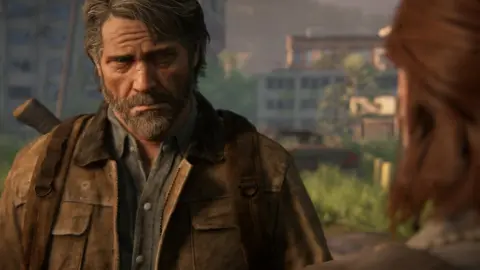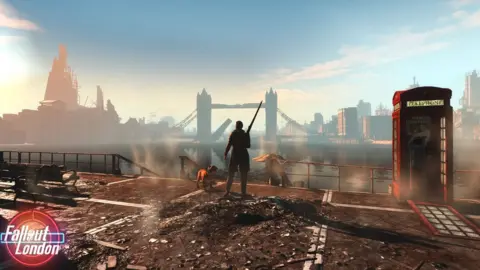Fallout: Could Amazon's show turn TV viewers into gamers?
 JOJO WHILDEN
JOJO WHILDENVideo game adaptations are a hot property in Hollywood.
Fallout, a new Amazon Prime series based on the post-apocalyptic gaming franchise of the same name, has been thrilling reviewers and fans, and has been commissioned for a second season.
Adapting a video-game franchise to the big screen used to be a cursed endeavour - but more recent efforts have hit high scores. Last year's Super Mario Bros Movie took the second-highest box office receipts of 2023, beaten only by Barbie..
Meanwhile, on TV, The Last of Us, which earned Emmy and Golden Globe nominations for its performances and gripping story, surprised many viewers when they found out about its gaming source material.
The appeal of video games to Hollywood studios is obvious. The biggest games have millions of dedicated fans - and a ready-made world for writers and directors to use.
Adaptations can clearly draw viewers. But can the phenomenon work in reverse? Can, for example, the new Fallout TV show convince viewers to try the role-playing games that inspired it?
 Sony/Naughty Dog
Sony/Naughty DogSince the release of the TV show, Fallout games have seen a huge spike in interest. In Europe, Fallout 4, a 2015 game, was the top seller this week, and the wider series occupied four of the top ten chart slots.
It should be noted that Bethesda, the Microsoft-owned studio that makes the game, reduced the prices of titles in the series, and even made multiplayer title Fallout 76 free for a short time.
You could argue that most of these downloads will come from established fans who watched the show and felt a pang of nostalgia. But not everyone's so sure.
James Batchelor, editor-in-chief of website GamesIndustry.biz, says that downloads from established fans alone wouldn't have been enough to fuel Fallout's rise, suggesting people are checking out the games for the first time.
"It's got to be new people as well, new people wanting to try out these games themselves," he says.
"Amazon Prime has a much broader audience than the console market. And, as big as video games have become, they're not as mainstream as TV, film and streaming.
"And the fact that Fallout is based on a video game, people are going to be intrigued to see the source material.
"It's the modern equivalent of going to see the film and then deciding to read the book."
 Team Folon
Team FolonThe renewed interest in the games has not been good for everyone. One group of dedicated Fallout gamers were left disappointed this week when it emerged that a long-awaited fan project had apparently become an indirect casualty of the TV show.
Fallout London is a modification - or mod - that transforms copies of Fallout 4 on PC into a "game within a game", set in Britain.
Project lead Dean Carter says it has "snowballed" into a four-year project involving volunteers around the world that was set to be released, for free, on 23 April - England's national day St George's Day. Trailers for the project have had millions of views, and the team even got two former Doctor Whos on board to voice characters.
But, just this week, Bethesda announced it would roll out a delayed "next-gen" update for Fallout 4 - giving the game a graphical and performance boost - on 25 April.
It means Fallout London will potentially need weeks or months of extra work. Carter says Bethesda are "fantastic with their community" on the whole, and has urged Fallout London fans not to target the company, but admits he is frustrated he wasn't warned about the timing of the update.
"Manage expectations, because this is going to happen, rather than just blindsiding us out of nowhere, which is what has happened," he says. BBC Newsbeat has approached Bethesda for a response.
More shows based on games on the way
As you might expect, further shows and films inspired by games are on the way within the next year - including Minecraft, comedy shooter Borderlands and a third Sonic the Hedgehog movie.
Could there be a danger of video game adaptations going the same way as Marvel movies and losing audience interest by saturating the market?
While GamesIndustry.biz's Batchelor admits not every game "is guaranteed to make a good TV show or film", he thinks there's a lower risk of audiences getting bored.
"Video games aren't one genre," he says.
"There are so many different stories being told, so many different gameplay ideas that can be adapted. And video games are so varied.
"It's not going to become a case of 'oh God, yet another video game thing' because they're all so different.
"If we were seeing a Halo series and a Call of Duty series and a Battlefield series and a Medal of Honor series then yes, that would get tiring. But I think there's enough variety across what's been made so far."
He says one exciting thing for him is the potential to show non-gamers "a window into what video games can deliver".
"The Last of Us demonstrated that, actually, video games can tell really emotional, heartbreaking stories," he says.
"Fallout shows you video games can come up with really imaginative worlds that you want to spend a lot of time in.
"So these adaptations you're seeing can really help open a lot of people's eyes to the type of entertainment that you can find in video games."


